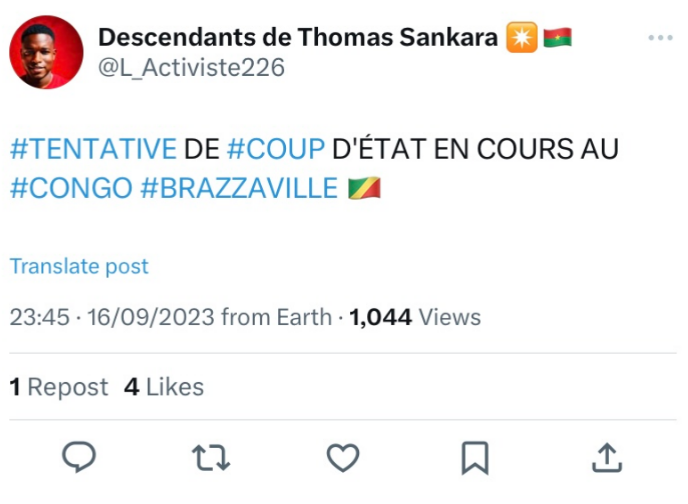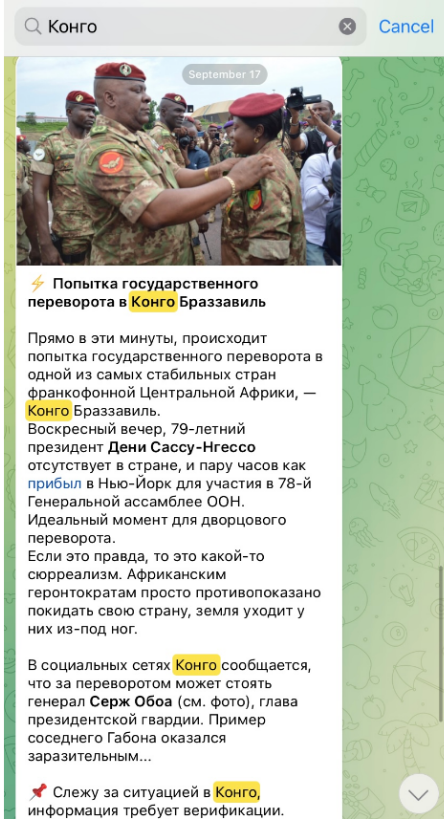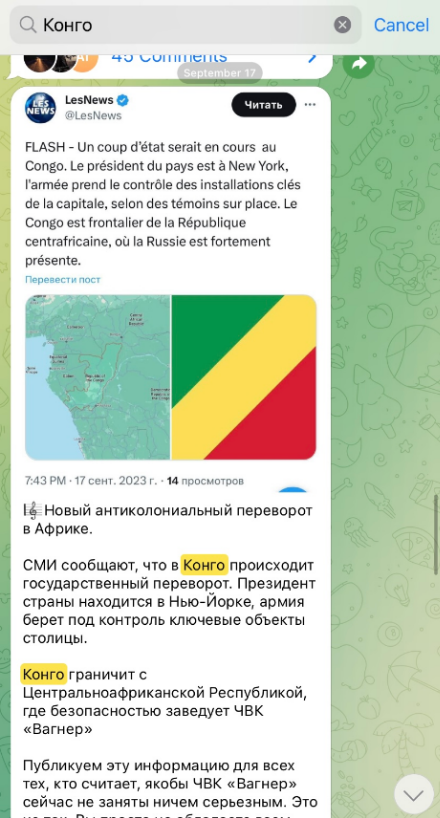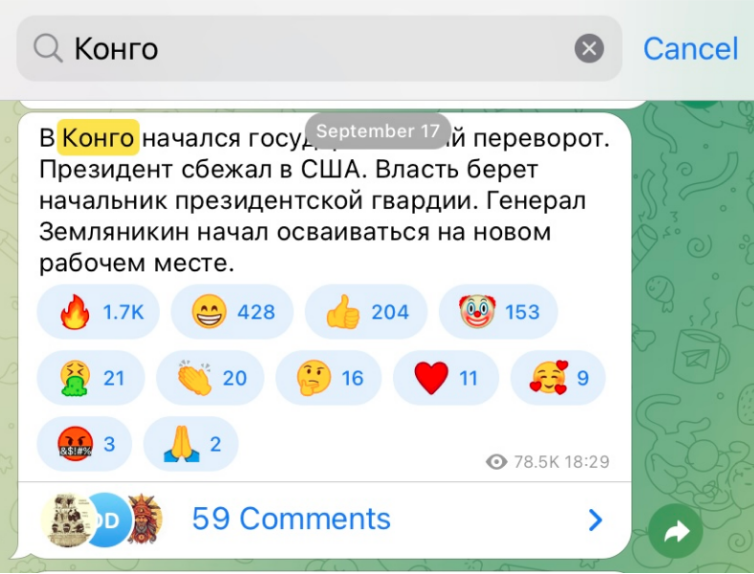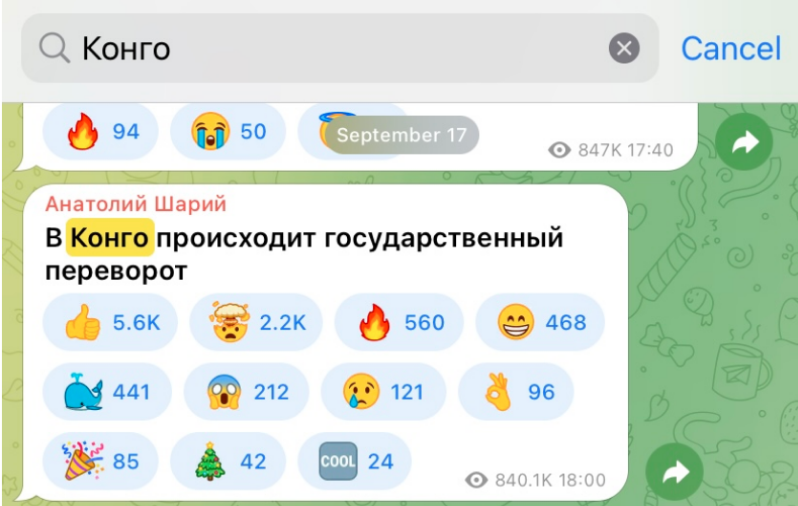Intelligence Report - Coup Rumors in the Republic of Congo
By: Ciaran Murray and Léopold Maisonny
Summary
Rumors of a coup d’etat in the Republic of Congo orchestrated by General Serge Oboa against President Denis Sassou-Nguesso emerged on X at 02:45 GMT on August 17, 2023. The rumors originated on social media but lacked concrete evidence. They gained traction, peaked, and waned following an official denial by the Ministry of Communications. Potential instigators, including the Wagner Group and Russia, may had complex motives, while citizen dissatisfaction due to economic struggles and limited civil freedoms could have inadvertently fueled the rumors. Looking ahead, President Denis Sassou-Nguesso's health and potential re-election in 2025 create scenarios for political instability.
Context
According to rumors emerging on X, General Serge Oboa (the Head of the Directorate General for Presidential Security) allegedly conducted the coup against President Denis Sassou-Nguesso while he was at the 78th session of the UN General Assembly in New York. President Sassou-Nguesso ruled Congo from 1972 to 1992, and since 1997. He was re-elected for a fourth consecutive mandate in 2021, after voting irregularities.
Under his tenure, human rights militants and opposition leaders have faced repression from the Congolese authorities. Highly dependent on oil price fluctuations, the Congolese economy has greatly suffered from the drop in global oil demand following the COVID-19 crisis. The subsequent high inflation (12.9% in 2022) coupled with the deterioration of public services and opposition repression have fueled popular discontent toward the ruling authorities.
President Sassou-Nguesso’s advanced age (79 years old) and declining health have led to speculations regarding his succession. His son’s appointment, Denis Christel Sassou-Nguesso, as the Minister of International Cooperation and Public-Private Partnership Promotion, casts the shadow of a dynastic succession.
Coup rumors took place after a series of coups in Western and Central Africa, in particular the 30/08/2023 Gabon coup, with which the rumors share similarities. General Serge Oboa, the alleged coup leader, is in charge of presidential security, like General Brice Oligui Nguema who ousted President Ali Bongo. The political context in Gabon also shares a dynastic character as President Ali Bongo who was running for a third presidential mandate, succeeded his father, Omar Bongo, who had been in power from 1967 to 2009.
SOCMINT Analysis
The first mention of a coup in Congo emerged on X (formerly Twitter) at 23:45 GMT on August 16, 2023. Other X accounts subsequently re-shared the rumors. Interaction with posts grew rapidly. The first mention received 1019 views, the third received 17.2k and the fifth received 220.2k.
Almost no evidence was posted with any of these claims. Two TikTok videos circulated on Twitter allegedly showing evidence of a coup in Brazzaville. The first depicted a ‘march’ on a street in Brazzaville. Accounts that posted it received between 500 and 50k views. While the video shows a group of people walking along a street, the high numbers of women and children as well as the flow of vehicles and individuals in the opposite direction suggest that this is instead a busy street.
The second depicted ‘celebrations’ as a result of a successful coup. Accounts posting this video received between 100 and 15k views. The video shows a group of people gathered around what looks like a bonfire. Once again, this is likely a local celebration taken out of context.
The TikTok accounts that posted these videos (@lechadmrexf and @waterlo.blede) appear to have been deleted.
The virality of the rumors reached its peak between approximately 17:00-20:00 GMT on August 17, 2023, and decreased after the Ministry of Communications and Media for the Republic of Congo issued an official statement denying a military takeover at 21:22 GMT on the same day. Rumors continued to spread on smaller accounts after this time until approximately August 19, 2023.
Potential Instigators
The rumors emerged on Telegram channels related to the Wagner Group. Popular Wagner-affiliated channels with between 100k and 600k subscribers posted unsubstantiated messages claiming a coup was underway in the Republic of Congo between 17:25 and 19:00 GMT on August 17, 2023.
One channel hinted that Wagner PMC was involved - this was almost certainly just for propaganda reasons. Wagner Group was likely interested in these rumors due to their presence in Africa as they assist African states with internal issues such as counterterrorism or security. It is highly likely a coup in the Republic of Congo would have resulted in instability, providing an opportunity for Wagner to offer security contracts to authorities in the country.
Coup rumors could have been spread as part of a Russian strategy to destabilize the region, allowing Russia to negotiate with African leaders from a stronger position. The Republic of Congo signed a military cooperation agreement with the Russian Federation in 2019. Destabilizing the country would likely allow Russia to renegotiate the contract on more favorable terms as Congolese leaders faced pressure to maintain internal stability.
Other potential initiators of the rumor include the Congolese authorities, the military, or the population, although no evidence supports these hypotheses. Finally, West African military juntas, especially the Burkinabés’ one, have increasingly integrated social media into their propaganda strategy and launched destabilization campaigns against their neighbors.
Motivations
The rumors’ initiator and their motive remains unknown. It is unlikely that the Wagner Group spread rumors as references to the coup only emerged on Wagner channels hours after their initial appearance on X. It is unlikely Russia was behind these rumors. While Russia could attempt to renegotiate its deal with the Congo, it is likely the Kremlin would first attempt to use diplomatic channels which did not occur prior to this situation. It is highly unlikely that General Serge Oboa spread rumors as this situation has likely damaged his relationship with the President, subjecting him to suspicion from the government. It is also unlikely that West African juntas spread the rumors, as the Republic of Congo, unlike ECOWAS members, does not have a hostile position toward them.
Dissatisfaction among the Congolese population at poor economic performance and limited civil freedoms could have caused citizens to start rumors in the hopes that this precipitated a real coup. The rumors likely emanated from Congolese social media due to a misreading of events, causing some to believe a coup was imminent. A similar situation in China caused rumors of a coup to make international headlines in 2022.
The origin and intent behind the rumor remain unknown. If the catalysts are linked to the Wagner Group or Russia, their objective might be to support a coup aimed at bolstering economic and political connections, mirroring the strategies observed in Burkina Faso and Mali. Conversely, if the instigators are Congolese, their motivations could encompass several possibilities: (1) gauge popular reaction to a real coup, (2) discredit General Serge Oboa, (3) distract the Congolese population’s attention from other issues such as opposition repression or inflation.
Given President Denis Sassou-Nguesso’s fragile health, a coup in the next five years is likely if he suddenly passes away. There will also likely be popular unrest in the Congo if Sassou-Nguesso is re-elected in 2025.
Consequences
Following the fake news in the Republic of Congo, the Cameroonian government threatened to arrest and prosecute citizens who spread rumors about coups in the country. This indicates fears among authorities in the broader region regarding the spread of fake news surrounding political instability. Cameroon’s president, Paul Biya, has ruled for 41 years and is considering running again in 2025. The state apparatus may be bracing for public discontent at the extension of his time in office.
It is likely other African nations such as the Republic of Congo and Equatorial Guinea will introduce similar limitations of freedom of speech to prevent domestic instability in countries ruled by long-serving presidents.

